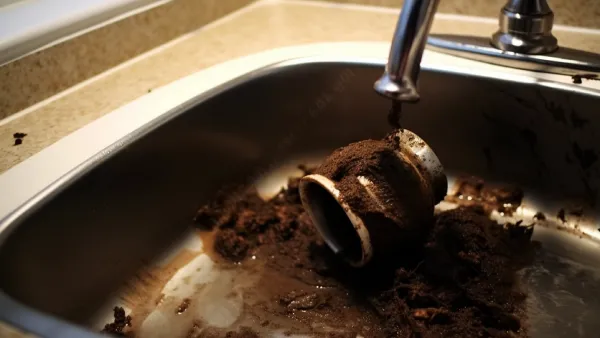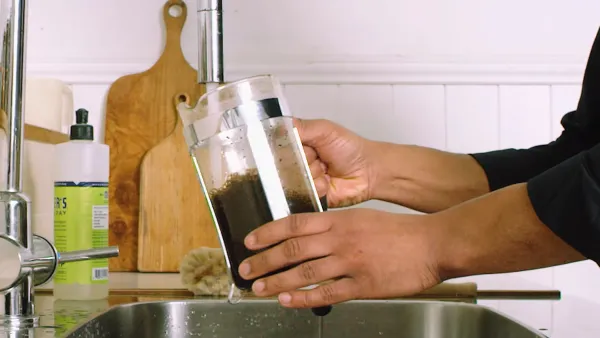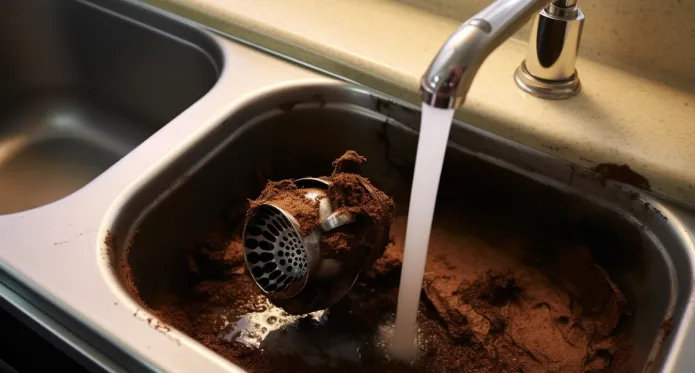Last Updated on November 9, 2023
Coffee grounds, a byproduct of our daily caffeine fix, often find their way into the sink or garbage disposal without a second thought. But suddenly, you might wonder if coffee grounds can be disposed of down the sink.
You may be surprised to know coffee grounds cause most kitchen sink clogs. So before you dump those leftover grounds down the sink, think twice. If you don’t want to risk damaging your plumbing, you can dispose of coffee grounds in several alternative ways.
Throughout this article, we’ll explore why putting coffee grounds down the kitchen sink is a bad idea and provide you with alternative ways to dispose of them.
Can You Put Coffee Grounds Down the Sink: Reasons Explained Why Not

Here are four other main reasons why you should not put coffee grounds down the kitchen sink:
- Clog formation
- Damage to garbage disposal
- Plumbing expenses
- Sustainable alternatives
No 01: Clog Formation
Coffee grounds clump together and bind with other materials in the drain. This can create stubborn clogs that impede the flow of water.
As the coffee grounds accumulate and mix with grease, soap residue, and other debris, the clogs become more solid and difficult to remove. Slow drainage and complete blockages are common consequences of disposing of coffee grounds in the sink.
No 02: Damage to Garbage Disposal
Dumping coffee grounds down the sink can damage your garbage disposal unit. When mixed with grease and other food particles, coffee grounds can form a dense paste harmful to the disposal blades. As the blades try to grind through this paste, they can become dull or even break, resulting in a malfunctioning disposal.
No 03: Plumbing Expenses
When coffee grounds are disposed of down the kitchen sink, they can lead to plumbing problems that result in expensive repairs. The clumps of ground can accumulate in your pipes, causing backups, slow drainage, foul odors, and gurgling noises. These issues can be not only inconvenient but also costly to fix.
No 04: Sustainable Alternatives
Another compelling reason not to dispose of coffee grounds down the kitchen sink is their environmental impact. When coffee grounds accumulate in pipes, they can lead to plumbing issues that necessitate harsh chemical drain cleaners.
These chemicals harm the environment, as they can find their way into waterways and harm aquatic ecosystems.
How Do You Dispose of Coffee Grounds?
In terms of disposing of coffee grounds as an alternative to your kitchen sink, there are several options that you can consider.
Composting
Adding coffee grounds to your compost is a great way to nourish your plants and reduce waste. Coffee grounds are rich in nitrogen, which provides essential nutrients to your compost and helps maintain a balanced carbon-to-nitrogen ratio.
To incorporate coffee grounds into your composting routine, simply mix them with other organic kitchen waste, like fruit and vegetable scraps.
Despite this, it’s important to avoid adding too many coffee grounds at once, as they can become compacted. Instead, combine them with other compostable materials, such as leaves or grass clippings, to maintain a healthy compost pile.
Gardening
If you have leftover coffee grounds, consider repurposing them in your garden by mixing them into the soil or sprinkling them around your plants.
As a natural fertilizer, coffee grounds can give your plants essential nutrients like nitrogen and potassium. They also help improve soil structure and water retention, which can benefit the overall health of your garden.
Household Cleaning
Coffee grounds can be repurposed for various household cleaning tasks. Their gritty texture makes them an effective abrasive cleaner for scrubbing stubborn stains, grease, or grime from pots, pans, and even oven surfaces.
Simply mix coffee grounds with water or dish soap to create a natural cleaning paste. Still, be cautious when using coffee grounds on porous or easily scratched surfaces.
Natural Deodorizer
Coffee grounds aren’t only great for absorbing and neutralizing unpleasant odors in your home but also work wonders in your kitchen.
If you have a lingering smell in your refrigerator, freezer, or pantry, simply place a bowl of dried, used coffee grounds in these areas to eliminate unwanted odors.
Also, coffee grounds can be used as a deodorizer for your hands. After handling pungent ingredients like garlic or fish, rub a small amount of damp coffee grounds between your hands, then rinse. The coffee grounds will help remove the strong smells and leave your hands smelling fresh.
Natural Pest Deterrent
Used coffee grounds can be a great natural pest deterrent, especially against mosquitoes, bees, and wasps. You can keep these pesky insects away if you scatter dried coffee grounds in outdoor areas like patios or near windows and doors.
The strong scent of coffee repels mosquitoes, while bees and wasps might find the grounds abrasive and choose to avoid nesting in areas where they’re present. Using this natural method, you can enjoy outdoor spaces without using chemical repellents.
Can you clean up the coffee grounds in the sink that you accidentally dropped?

Accidentally pouring coffee grounds down the sink can lead to potential blockages in your plumbing system. Yet, you can take steps to eliminate the grounds effectively and prevent further damage.
Start by running a generous amount of hot water down the drain immediately after the incident. This will help flush the grounds through the pipes. If you notice any partial blockages, you can use a sink plunger to dislodge the grounds.
If you experience persistent drainage problems or suspect a significant blockage, it’s advisable to seek professional plumbing assistance to avoid costly damage.
Are there any coffee ground uses that benefit indoor plants?
Consider using coffee grounds as a natural fertilizer for indoor plants, as they can provide nutrients and improve aeration.
An enriched soil and healthy growth can be promoted by scattering dried coffee grounds on its surface. Coffee grounds contain essential nutrients like nitrogen, phosphorus, and potassium, which benefit plant growth.
To avoid overdoing it, sprinkle a thin layer of coffee grounds and mix them into the soil to prevent acidity buildup.
Transform Your Used Coffee Grounds into Sustainable Disposal
Putting coffee grounds down the kitchen sink should be avoided. Not only can it clog your pipes and cause plumbing issues, but it can also harm the environment. Instead, consider disposing of your coffee grounds in compost or using them as a natural fertilizer for your plants.
So, the next time you finish your morning brew, remember how you can use those coffee grounds to positively impact your home and the environment. Don’t forget that even the smallest actions can have a big impact, so let’s brew responsibly and give our coffee grounds a second life.

